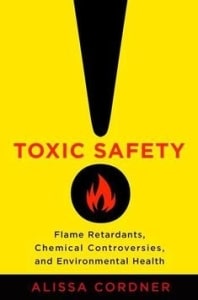Toxic Safety: Flame Retardants, Chemical Controversies, and Environmental Health
April 6, 2016 @ 10:00am (AKDT)

 Initially marketed as a life-saving advancement, flame retardants are now mired in controversy. Some argue that data show the chemicals are unsafe while others continue to support their use. The tactics of each side have far-reaching consequences for how we interpret new scientific discoveries. Join environmental sociologist, Alissa Cordner, Ph.D. for a discussion of the more than one hundred interviews she conducted with activists, scientists, regulators, and industry professionals to isolate the social, scientific, economic, and political forces influencing environmental health policy today.
Initially marketed as a life-saving advancement, flame retardants are now mired in controversy. Some argue that data show the chemicals are unsafe while others continue to support their use. The tactics of each side have far-reaching consequences for how we interpret new scientific discoveries. Join environmental sociologist, Alissa Cordner, Ph.D. for a discussion of the more than one hundred interviews she conducted with activists, scientists, regulators, and industry professionals to isolate the social, scientific, economic, and political forces influencing environmental health policy today.
Cordner’s new book, Toxic Safety: Flame Retardants, Chemical Controversies, and Environmental Health (Columbia University Press, 2016) is a revelatory text for public-health advocates that demonstrates that while all parties interested in health issues use science to support their claims, they do not compete on a level playing field and even good intentions can have deleterious effects. On this call we will also look at how Dr. Cordner’s findings relate to efforts in Alaska to pass public health legislation. The Alaska State Legislature is currently considering the Toxic-Free Children’s Act (SB 111/HB 199), a bill that would ban ten toxic flame retardants in children’s products and furniture. The bill recently passed in the Senate Labor and Commerce Committee and is awaiting a hearing in the Senate Judiciary Committee. Alissa Cordner, Ph.D. is assistant professor of sociology at Whitman College and coauthor (with Gianpaolo Baiocchi, Elizabeth A. Bennett, Peter Klein, and Stephanie Savell) of The Civic Imagination: Making a Difference in American Political Life (2014).
